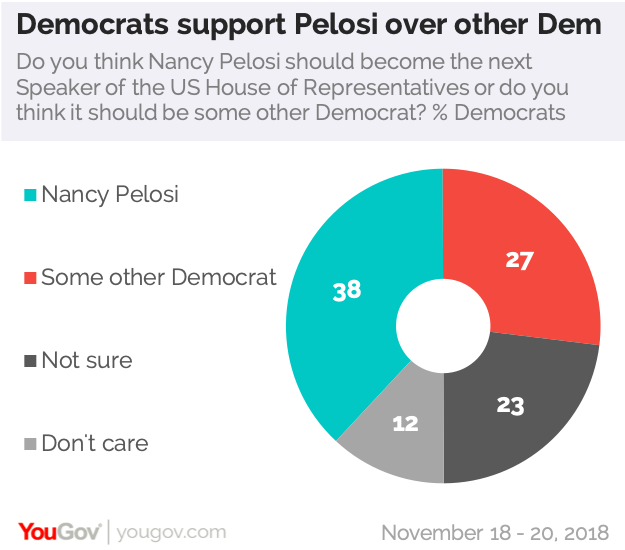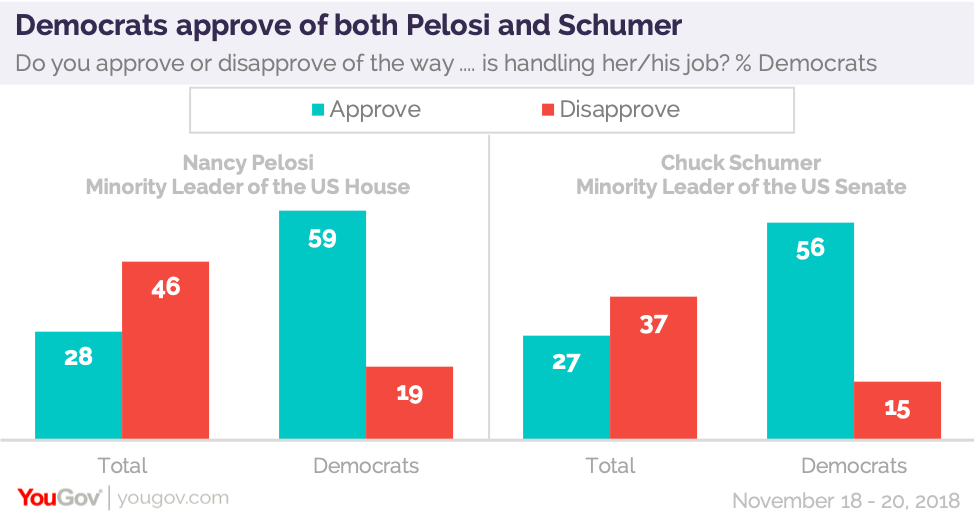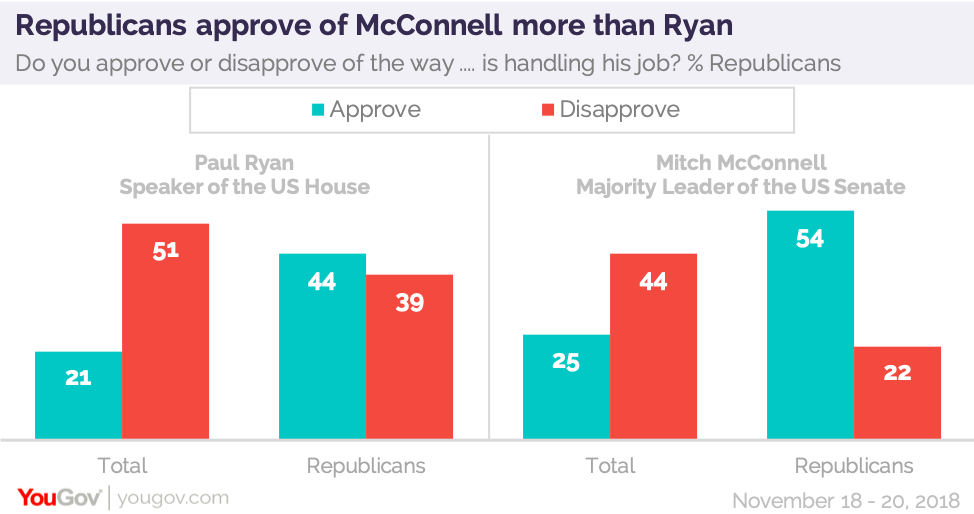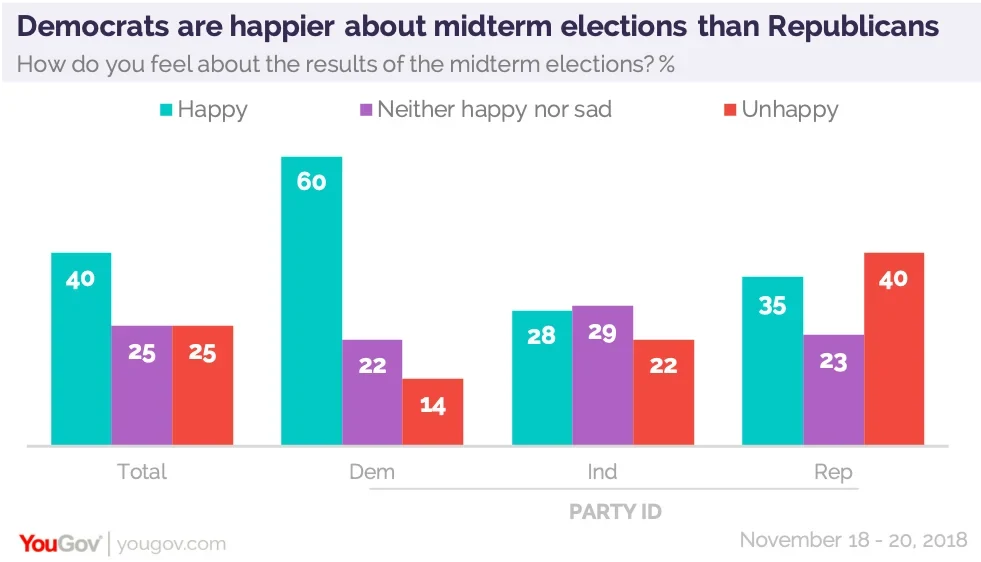Democrats want to focus on healthcare
As current House Minority Leader Nancy Pelosi gains support from some Democratic Members of Congress who had opposed her return to the Speakership in next year’s Democratic-controlled House of Representatives, she also has the support of the party’s rank-and file. There is still some opposition however, and a division of Democratic priorities for what should happen in the next Congress, with investigative payback for Republicans competing with policy options.

In the latest Economist/YouGov Poll, Democrats are more likely to support Pelosi’s claim on the House gavel than to oppose her return. With no obvious opposition candidate, however, there remains some opposition, and many admit they aren’t sure or don’t care.
Both male and female Democrats support Pelosi (though women are more likely to take neither position). Liberal Democrats favor her ascension to the Speakership 46% to 25%, non-liberal Democrats (those who call themselves moderates or conservatives) are closely divided, with 28% for Pelosi and 32% wanting someone else. Those who supported Vermont Senator Bernie Sanders in the 2016 Democratic primary season also are evenly divided when it comes to Pelosi becoming Speaker.
Pelosi maintains high popularity with Democrats, even while she is viewed negatively by the public overall. But the other Congressional leaders fare similarly: nationally they are all seen negatively, except within their own party.

Current House Speaker Paul Ryan receives the lowest marks among those in his own party, perhaps because he chose to retire from Congress at the end of this term. Nearly as many Republicans disapprove of the way he is handling his job as approve. His successor as GOP House Leader, Kevin McCarthy, fares better than Ryan does with Republicans. Republican Senate Majority Leader Mitch McConnell, who received poor marks even from his partisans in the past, now gets good scores with them.
A majority of Republicans view the current Congress as accomplishing as much or even more than Congresses usually do. Still, like Americans overall, more disapprove than approve of how Congress has been handling its job. Republicans may have gained seats in the Senate in this month’s midterm election, but they lost control of the House of Representatives (something most Republicans in this poll had expected would remain in GOP hands). Consequently, Republicans are far less happy than Democrats are with the midterm results.

Democrats and Republicans have very different priorities for what Congress should focus on now. A third of Democrats say Congress should focus on health care or gun control, but about the same percentage want the focus to be on oversight, investigation, or impeachment as their top priority. Liberal Democrats are nearly twice as likely as moderates and conservatives to want Congress to focus on oversight (though there is little difference in whether or not the primary focus should be on impeachment).
Republicans care most about immigration and budget balancing.But there are many concerns beyond what Americans claim is their most important issue for Congress. How to deal with each single issue is also party-based. Most Democrats say it is very important or a “top priority” to protect and improve the Affordable Care Act. Two in three put providing Medicare for all in that category. Meanwhile, most Republicans prioritize repealing Obamacare.

The parties do agree in general on the importance of prohibiting insurance plans setting higher rates for pre-existing conditions, suggesting that in this area, there may be room for compromise. Democrats are twice as likely as Republicans to say this is a “top” priority, but a clear majority of Republicans say this is at least very important to them.
Just over half in each party prioritize immigration reforms that would promote border security and provide a path to citizenship for undocumented immigrants. But stark partisan differences show up when immigration specifics are asked: most Republicans prioritize building a border wall, and half saying it is at a minimum very important to revoke birthright citizenship. Democrats prioritize protecting “Dreamers,” those currently protected by the DACA (Deferred Action for Childhood Arrivals program). And while more than a third of Republicans would prioritize decreasing legal immigration, most would not.
Most Democrats want to see stricter gun control (with nearly half saying that is a top priority) and increasing the federal minimum wage. Most Republicans prioritize balancing the budget. But infrastructure reform could be another area for compromise: 69% of Democrats and 56% of Republicans call infrastructure work very important or a top priority. Few in either party are especially interested in having Congress work on entitlement reform.
There remains the issue of how important investigation and possible impeachment are to Democrats. More (46%) call investigation of Administration wrongdoing a top priority than say that about impeachment (33%). But majorities of Democrats think each is very important to them.
See full toplines and tables results
Image: Getty







